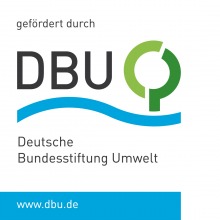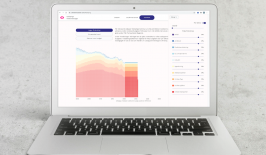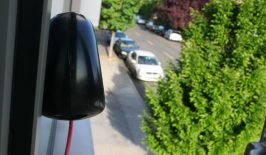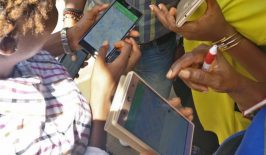Climate change, the plastic vortex in our oceans, mountains of waste in nature – for anyone who cares about the environment and climate there appears to be countless issues. But where and how to start? Most of us are now aware that CO2 is saved by switching to trains and bicycles, consuming less plastic and meat, and disposing of our own waste properly. If the streets then fill up with cyclists, this will at some point be followed by the conversion of transport infrastructures. And when certain products are left on shop shelves, this can certainly be a signal to companies of shifting consumer patterns.
Nevertheless, the scope of these everyday actions is limited, and major steps in climate protection are now being taken when the industry, agriculture, transport and the energy markets move toward CO2 neutrality (see short study: Doing your fair share for the climate?). But how do we get moving on environmental and climate protection? One direct way is to stand up for a cause at demonstrations and protests. Another is to donate to organisations that address these issues and are better able to pressure both politicians and companies.
From civil society comes yet another way to get involved, through apps and platforms that enable technology-enabled direct communication between citizens, civil society, academia, governments, and businesses. Such tools are civic tech, or public interest tech, and include a variety of applications. German especially has developed a number of projects in this direction. This is largely thanks to the country’s strong legislature that compels both private and public institutions to abide by requests for information. These regulations can then be used to fuel a wide variety of civic society applications, perhaps most notably FragDenStaat (Ask the State) from the non-profit Open Knowledge Foundation.
Knowledge and Reliable Information for Consistent Climate Protection
How many rivers exceed the acceptable values of pollutant substances, and how regularly? How severe are the noise and particulate pollution levels in my neighborhood? What environmental impact will a certain construction project have? These and many other questions fall under the German Freedom of Information Act, the Environmental Information Act or the Consumer Information Act and can be sent directly and easily to the relevant authorities via the FragDenStaat Internet platform. If a user submits a request via the portal, it is sent to the relevant authority via a specially generated email address. As soon as an answer is received, it is automatically published on the platform and the information is available to everyone.
In addition to many other actions, FragDenStaat’s Climate Helpdesk is aimed directly at environmental and climate activists and organisations and makes important information from public authorities available to them free of charge. If requests are rejected or delayed, the team also advises on the next steps and, in the case of promising or politically relevant proceedings, even takes over the coordination of lawyers and the financing of the process.
In this way, information that all too often remains exclusively with authorities can serve the common good – and become an important database that citizens can refer to and which supports environmental and climate activists, among others, in their actions and demands. Such open information sources, if established elsewhere, could become a major boon for climate movements across the globe.
Exploiting Legal Obligations for the Common Good
Another German project, ToxFox, also takes advantage of legal manufacture obligations to provide free and accessible information for laypeople. Using the BUND app, care products and children’s toys can be checked for harmful ingredients directly in the store via a barcode scan. If a product is not yet recorded in the database, a message appears and the toxicity request is sent directly to the manufacturer or retailer via the app. Since these are legally obligated to respond within 45 days if a product contains particularly hazardous substances, a response must also be received – which in turn flows directly into the database and is available there to other consumers.
In this way, users themselves allow the app’s database to grow steadily. At the same time, manufacturers and companies are getting indications that an increasing number of people are concerned about what their products contain.
According to BUND, more than 1.5 million people are already using the free app, and BUND is working to ensure that people throughout Europe will soon be able to access similar apps. In the “LIFE AskREACH” project, apps based on the ToxFox model can already be used throughout the EU.
Apps Against Plastic Waste
The Litterati app also uses similar mechanisms. The app, which is one of the most widely used – geographically speaking – in the world, originated in the USA and allows users to photograph, geotag and remove litter found in streets, parks and forests. In this way, the geotaggers not only collect trash, but also information about the type of trash, the producer, and the location where it was found.
This data can be important information for municipalities, organisations and companies to develop appropriate sustainable solutions, as this example from San Francisco shows: According to a resolution passed by the San Francisco City Council, cigarette manufacturers should be held more accountable for the litter left behind by their products and should contribute to the cost of removing cigarette butts from sidewalks, parks and bodies of water through an increased tax. But how to determine what percentage of litter comes from cigarettes to estimate the cost to the city of removing them? Over a five-day period, volunteers then mapped and tagged litter via Litterati. Based on this data, the court then not only voted in favor of the new cigarette tax, which had been challenged by the tobacco industry, but even decided to double the amount of the original tax.
A counterpart to Litterati is a German app muell-weg.de. In just three steps, users can automatically determine the location of the garbage, simply by GPS or by reading the GPS data from a smartphone photo. The responsible municipality is then automatically determined and a pre-formulated message is created that can be sent immediately. The trick behind it: Municipalities are not allowed to ignore a waste find reported by email.
For 85 percent of the municipalities in the Federal Republic of Germany, the contact details with direct contact persons are now listed; municipalities that are not yet listed can also be entered themselves. In this way, users not only make acute incidents visible, but also waste hotspots, which can help in the search for solutions.
The app Replace Plastic from the Flensburg association “Küste gegen Plastik” (Coast against Plastic) starts one step earlier, i.e. before packaging begins its journey in the shopping cart. In order to combat the flood of plastic in the supermarket, users can use the app to report their annoyance about products with particularly plastic-intensive packaging directly to the manufacturers. All they have to do is scan the barcode. Replace Plastic then collects the feedback and forwards it to the manufacturers. However, in order for the pressure on manufacturers to be great enough, many active users are needed.
Promoting Common Good through Citizen-Owned Technologies
These examples show how apps and web tools can build bridges between civil society, municipalities and companies if they are used wisely. They enable direct communication between the various actors, which is otherwise difficult – if not impossible – to establish, and increase transparency for everyone by making information public that is otherwise difficult to access. And they give citizens the opportunity to participate in collecting data and making problems visible.
There are many more projects in which citizens become active via civic tech applications; as bike path mappers at Bike Citizens, as lay scientists in research projects like NASA’s Cloud Gaze, as volunteer cartographers at OpenStreetMap, or as air quality gaugers at sensor.community.
However, collecting data and making information accessible is often only the first step. Long-term and profound changes are only triggered if something happens with this data afterwards. Litterati, for example, therefore repeatedly relies on cooperation with various NGOs and institutions that use the collected data to develop concrete demands and build political pressure, as the example from San Francisco shows.
FragdenStaat also regularly launches campaigns together with other civil society actors. For example in 2019, they launched the German-lanuage project Topf Secret, with international NGO Foodwatch. Via the platform, potential diners and consumers can query the results of hygiene checks in their favorite restaurants, bakeries and supermarkets with just a few clicks and publish them on the website. The Climate Building Check, which FragDenStaat initiated together with Deutsche Umwelthilfe (German Environmental Aid) in 2020, was also designed to shed light on the energy consumption of the public building stock. Via the campaign site, anyone can query the energy performance certificates of public buildings with just a few clicks, because under the Environmental Information Act (UIG) or similar regulations of the German states, public authorities are obliged to provide information. The answers are then uploaded for all to see.
As the campaign has shown, the public sector is currently not fulfilling this function, and for very few buildings there is neither a valid energy demand certificate nor a renovation roadmap that meets the requirements for a climate-neutral public building stock by 2030. Only a fraction of our schools, city halls, swimming pools and the like are in a condition compatible with climate targets. So it’s time to keep up the pressure – the data from the Climate Building Check, which is now available for all to see, is a good starting point.
This article is part of the dossier “Civic Tech – Ways Out of the Climate Crisis with Digital Civic Engagement”. You can find all articles of the dossier here: Special Feature Civic Tech

The Special Feature is part of the project funding of the German Federal Environmental Foundation (Deutsche Bundesstiftung Umwelt – DBU), in the framework of which we are producing four special features over two years on the topic of “Opportunities and potentials of digitalisation for sustainable development”.
More information here. This article is an English-language translation of an original article which appeared on the German RESET website.








